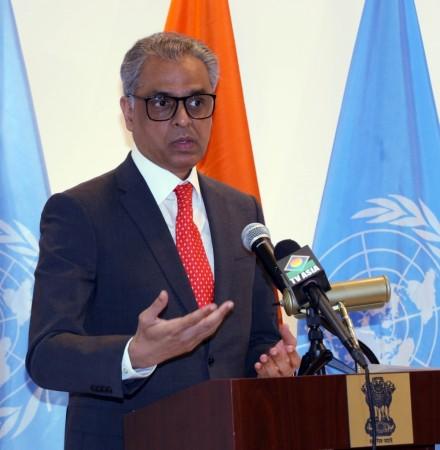
Pakistan's "malware" of falsehoods against India has found no takers at the UN Security Council and it has to heal itself of the malaise of terrorism and subversion, India's Permanent Representative to United Nations Syed Akbaruddin said.
In a sharp message to Pakistan at the Council, Syed Akbaruddin said, "My simple response to Pakistan is even though it is late, neighbour, heal thyself of your malaise. There are no takers here for your malware."
He said that Pakistan, which "epitomizes the dark arts has, yet again, displayed its wares by peddling falsehoods earlier today."
"It is increasingly acknowledged that the Council faces crises of identity and legitimacy, as well as relevance and performance. The globalisation of terror networks, the weaponisation of new technologies, the inability to counter those resorting to subversive statecraft are showing up the shortcomings of the Council," Akbaruddin was quoted as saying by a news agency.
No takers for Pakistan’s malware @UN
— Syed Akbaruddin (@AkbaruddinIndia) January 10, 2020
C statement https://t.co/pOwGQknmBk pic.twitter.com/gXHjHOrfsY
Pakistan's claim at UN
Earlier, Pakistan's Permanent Representative Munir Akram had claimed that 8 million people were under curfew in Kashmir and there was a communication blackout.
But even as he spoke there is no curfew in Kashmir or a communication blackout and India was opening it for the world to see on the ground. A group of diplomats from 17 countries began a two-day visit to Kashmir on Thursday to see for themselves the conditions in the Union Territory. The group included US Ambassador Kenneth Juster.
The Pakistani attack came during a debate on "Maintenance of International Peace and Security: Upholding the United Nations Charter."
Akbaruddin said: "Notwithstanding all its imperfections, the United Nations Charter is still the main incarnation of the global spirit. Constancy to its principles promotes common good."
Akbaruddin blasts Pakistan
He warned that "moving away from a formal system which is well understood, to one which is based on untested interpretations, may have unexpected consequences. Justice dispensed on the fly may come to be resented."
But he said that the organs of the UN have to be reformed to be able to fulfil the expectations of and obligations under Charter as the world body faces contemporary challenges and this can be accomplished by using the Charter.
Akbaruddin focused on the need to reform the Security Council saying, "We need a Council that is representative of current global realities, credible, and legitimate, rather than one that rests merely on the claim that it existed at the inception."
He said, "It is increasingly acknowledged that the Council faces crises of identity and legitimacy, as well as relevance and performance. The globalisation of terror networks; the weaponisation of new technologies; the inability to counter those resorting to subversive statecraft are showing up the shortcomings of the Council."
But he said that the answer to the crises the Council faces require working through Charter provisions that provide for reform and change.
Joao Genesio de Almeida Filho, a director in the Brazilian Foreign Ministry, was among representatives of several countries who urged reform of the Council.
He noted that Latin America was not represented in the ranks of permanent members of the Council and said that it should be rectified in this the 75th year of the UN.
Japan's Permanent Representative Kimihiro Ishikane said that the Council should be reformed to reflect the current realities if it were to retain its legitimacy.
Nicolas de Riviere, the permanent representative of France, said his country supported the reform of the Council and wanted veto rights of permanent members suspended in cases of mass atrocities.
Akram struck a discordant note by using the forum for attacks on a neighbour, moving away from the purpose of the debate.
In his litany of charges against India, Akram said that Prime Minister Modi's government may launch a "military adventure to divert attention from the protests against the Citizenship (Amendment) Act (CAA).
He claimed that the CAA, which provides refuge for victims of religious persecution by his Islamic republic, was Islamophobic.
The CAA allows expedited citizenship for Christians, Hindus, Sikhs, Parsis, Buddhists and Jains, who do not have full citizenship rights in his country and flee violent persecution.
Akram said that the "aerial exchanges" between India and Pakistan in February were contained because Pakistan Prime Minister Imran Khan returned the captured Indian pilot, Wing Commander Varthaman Abhinandan.
He was shot down while on a sortie to destroy terrorist camps in Pakistan-held Kashmir after an attack by Pakistani terrorist organisation Jaish-e-Mohammed killed more than 40 Indian security personnel.
Akram said that if India launched another "limited war," there was "no assurance that it will remain limited."
(With IANS inputs)

















